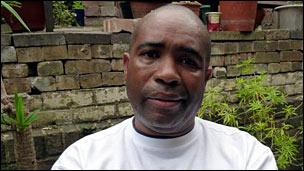Fears new benefits tests will force sick to work
- Published
A controversial health test to decide who will get long-term sickness benefits is being rolled out further, despite evidence that it is finding people with serious illnesses "fit for work".

Mr Nestor was diagnosed with cancer and had a triple heart bypass
Two years ago, Vincent Nestor's doctors told him he was a "dead man walking". He was diagnosed with an incurable form of stomach cancer at the same time as being sent for a triple heart bypass operation.
"Everything went downhill," he says.
His 20-year career as a driver in south London abruptly ended and his health meant he could barely function without shortness of breath and chest pains.
Despite this, Mr Nestor was declared "fit for work" when he applied for sickness benefits.
Slashing bill
He had scored zero points under a controversial procedure called the Work Capability Assessment (WCA) - which the coalition government now plans to extend.
The WCA was first rolled out in 2008 for new claimants like Mr Nestor.
It was part of a replacement to the old system of incapacity benefits, which was widely seen as swollen and inefficient.
In the rush to cut the cost of Britain's welfare state, slashing the bill for incapacity benefit is one of the biggest prizes of all.
In all, the payments of around £90 a week go to over 2.5 million people who cannot work because of their health - 7% of British adults.
With all the related costs factored in, these benefits cost Britain £12.5bn a year. Many of those who started claiming in previous recessions, in parts of the UK where heavy industry collapsed, have in effect stayed on for life.
The new government wants to press ahead with a plan to re-process the millions of people who are still on the old incapacity benefit system - using the WCA test.
Mr Nestor has since won an appeal against the assessment that he is fit to work. But stories like his mean that there is concern that the new test will not just weed out scroungers, it may end up penalising the genuinely sick.
Fatigue and depression
The re-processing exercise will begin with 1,700 people in Burnley and Aberdeen in the autumn, before being rolled out nationally from April 2011.
At the moment, three quarters of those new claimants for sickness benefits either drop out or are found fit for work.
One of those declared fit to work was John Birmingham, who lives in ccrington, near Burnley, and suffers from Parkinson's disease, a degenerative condition of the central nervous system.
He spent 26 years in a manual job but after becoming ill - his left arm and leg became very weak; he suffers tremors and depression - has had his driving licence revoked on health grounds. He cannot cook for fear of causing accidents.
He is still determined to find a job - but says he needs the extra training and support he would get on the new Employment Support Allowance benefit.
When he applied, he was also asked to go to a private testing centre.
"They asked me could I pick an empty box up," he says. "But it's a fluctuating illness. So I might be able to do it one day but not the next, but that was never taken into account."
Zero points
His record from the test says: "The evidence does not support that they suffer from a physical condition severely affecting the trunk or upper limb function."
"Therefore they should be able to use a star-headed tap, reach to the top pocket of a coat or jacket, pick up and move a 0.5 litre carton full of liquid and pick up a £1 coin or equivalent."
Mr Birmingham also scored zero points - and his test was a key part of the decision that he be rejected for benefits.
Stories like his have highlighted problems in the test, and have angered welfare groups like the Citizens Advice Bureau (CAB).
Paul Hoggarth from the Burnley CAB helps people appeal against their decisions. Overall, a third of those declared "fit for work" appeal, and 40% of them win - which he says shows the test is flawed.
"I think the test and the computer system is inflexible," he says. He argues that the simple question-and-answer format fails to register a lot of serious health conditions.
The coalition government at first seemed to agree with Mr Hoggarth's reservations.
The procedure was tweaked so that people with certain conditions, such as some mental illnesses and cancer requiring chemotherapy treatment, did not have to take the test.
The government then ordered a full independent review of the test to report at the end of the year.
But ministers have said they will still be using the test to re-process the millions on the old incapacity benefit, starting in Burnley in the autumn - months before the review concludes.
"I believe the Work Capability Assessment is the right test for the future," says Work and Pensions Minister Chris Grayling. "We will stick with and see it through."
"There are certainly refinements I have wanted to make and that I will want to make. And the review will report to us later this year and give us time to make refinements."
But Mr Grayling does not believe the government has an obligation to get the test completely right before applying it to people who are sick or disabled.
"I think the reality is we have a historic challenge to help transform the lives of millions of people who are stranded on benefits in this country," he says.
- Published28 June 2010
- Published28 June 2010